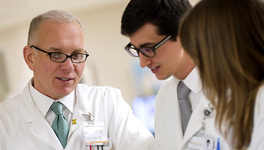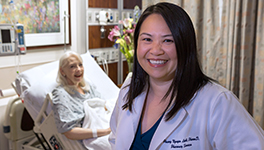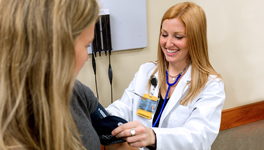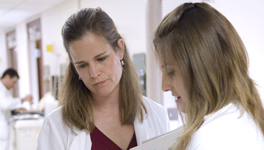
6/22/2022
Mary Pat Bulfin
Her Story
Mary Pat Bulfin, PharmD, BCPS, received her Doctor of Pharmacy degree from the University of North Carolina Eshelman School of Pharmacy at Chapel Hill in 2018. She completed her PGY1 pharmacy practice residency at Novant Health in Winston-Salem, North Carolina, in 2019 and then completed her PGY2 Medication Use Safety residency at University of Kentucky HealthCare in Lexington, Kentucky, in 2020.
Mary Pat is the Medication Safety Pharmacist for the adult patient population across the Cleveland Clinic health-system. She is responsible for investigating medication safety events, identifying system gaps, and implementing best practices recommended by various patient safety organizations, including the Institute for Safe Medication Practices (ISMP), to address these gaps from a health-system perspective. She focuses on encouraging a culture of learning and transparency by engaging daily with direct patient caregivers and interdisciplinary leaders on medication safety topics. She is trained as a peer supporter for caregivers involved in a medication safety event and she also serves as a preceptor for student pharmacists and PGY1 and PGY2 pharmacy residents.
Facility
Mary Pat is based at Cleveland Clinic Main Campus, located near the heart of downtown Cleveland, Ohio. Cleveland Clinic is a 6,500-bed, non-profit, multi-specialty academic health-system and is comprised of 19 hospitals and more than 220 outpatient failities. Cleveland Clinic also serves patients at additional locations in Florida, Nevada, Toronto, and internationally in London and Abu Dhabi, making it the world’s first integrated international health system. With more than 65,000 caregivers worldwide, Cleveland Clinic has almost six million patient visits per year.
Recent Significant Projects
I have led Cleveland Clinic’s efforts to complete the Medication Safety Self-Assessment for Perioperative Settings from the Institute for Safe Medication Practices (ISMP). Completion of this assessment involved collaboration with our Anesthesiology, Surgical Services, Nursing, and Pharmacy departments to evaluate our practices against the ISMP suggested best practices in over 70 adult and pediatric perioperative care settings. I enjoyed the opportunity to build relationships with our colleagues within the Anesthesiology Institute, which has fostered a culture of ongoing learning and sharing to promote safe medication practices. I also work closely with our pharmacy automation and informatics teams to optimize clinical decision support in automated dispensing cabinets (ADCs) and within the electronic health record (EHR). Most recently, I am working on a project to prevent the loading of specific high risk medications in ADCs across the health-system to mitigate risks for inadvertent patient administration if pulled in error from an ADC. I am also working on optimization of a pharmacist-facing Best Practice Alert (BPA) in the EHR to promote safe use of transdermal fentanyl patches and other long-acting opioids.
Current Involvement in ASHP
I currently serve as a member of the ASHP Section of Inpatient Care Practitioners’ (SICP) Educational Steering Committee (ESC). Within this group, I enjoy leading the Journal Article Workgroup to write articles on key topics within pharmacy practice for submission to AJHP.
Why did you become involved in ASHP?
I have valued being an active member of ASHP since I was a student pharmacist and attended the Midyear Clinical Meeting each year. I appreciate having a diverse group of colleagues from around the country who help me grow, both personally and professionally.
Advice for Someone New to Specialty Area
For those new or interested in Medication Safety as a pharmacy specialty area, I would advise them to stay curious, ask questions, and listen. Before I can address any medication safety concern from a health-system perspective, I first need to understand the process from those who live it every day. I am constantly striving to amplify the voices of others to encourage a culture of learning and reporting of medication safety events. I am also learning that effective implementation of sustainable processes that close system gaps are best addressed through a “team of teams” that empowers others to engage and lead changes.
How would you explain the value of ASHP to a friend or colleague?
ASHP provides a tremendous network of colleagues who push me to be my best, share in the exchange of medication safety best practices, and advance the pharmacy profession. I value the wide array of continuing education that ASHP provides to stay up-to-date on advancements throughout the pharmacy profession and maintain my board certification as a pharmacotherapy specialist.
What is the value of ASHP for the profession?
ASHP is invaluable to the pharmacy profession because it provides a platform to unite pharmacists in advancing the practice of pharmacy, sharing best practices, and providing evidence-based, safe and effective patient care.

Inpatient Care Practitioner

Section of Inpatient Care Practitioners
Professional group for ASHP members working as front line pharmacists in diverse practice settings


